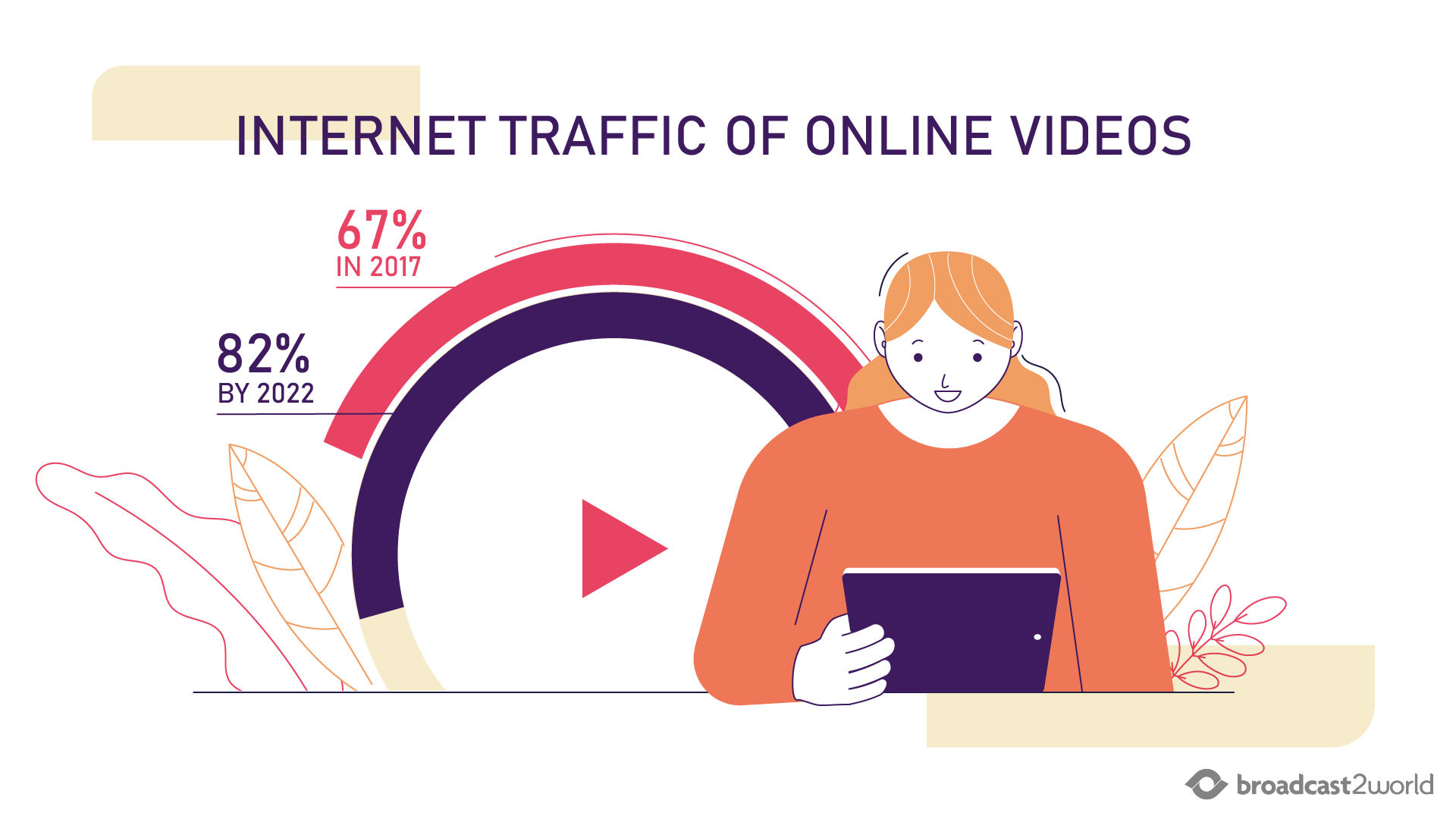
Videos will account for a whopping 82% of all consumer internet traffic by 2025.

This number alone underlines just how important video marketing is now. If you aren’t investing big in marketing videos, you’re missing opportunities to scale your business.
That said, if done the wrong way, video marketing can cost you huge amounts of money.
So, while there are opportunities, one must know how to tap on them to drive maximum ROI.
If you’re planning to take up video marketing, opting for explainer videos could be a great idea. More big brands are steering towards this explainer video, and they are seeing better results. If it fits your marketing needs, you should steer the same way.
The phrase “explainer videos for business” is self-explanatory.
These short videos help explain a brand story, product, or service for your business through interactive visuals. Ideally, they incorporate stories, characters, and texts to effectively and compellingly convey a message.
These videos can help you in most aspects of your business. Brand videos can help you improve brand awareness.
Product videos, testimonial videos, and commercial videos, on the other hand, can help you with demand generation.
Furthermore, corporate videos, demo videos, training videos, and internal communication videos can help you with demand retention.
They are one of the most popular forms of explainer videos, primarily distributed across social media platforms and used in landing pages.
What makes them popular is the way they tell stories. Let’s discuss why storytelling is so important.
Explainer videos are meant to tell stories. It is an underrated and underappreciated format that is far more engaging and impactful than any other medium.
While words and information appeal to the minds of the viewers, they don't appeal to the heart. Facts and figures are easy to understand but lack an emotional impact, making them easy to forget.
When you list specs and numbers, viewers tend to get bored much before your CTA comes up. What that means for you, as a business, is that you've already lost half of the battle.
If you can't hold their interest until the CTA comes up, you can't compel them to take action. And that is the reason why conversion rates are on the lower side when explainer videos only explain.
Storytelling is an art that touches hearts and stirs emotions. Using it with your explainer video makes the viewer connect with and trust you. This creates a more powerful and longer-lasting impact.
Think of the last time a movie really moved you. Remember the lasting impression made by the experience and how it stayed with you.
The story drew you in and took you on an emotionally charged journey. The ups and downs, leading to a powerful and satisfying conclusion stuck in your mind.
This is the secret behind the popularity of the video format, and in animation in particular. Animation gives you unparalleled freedom because you’re only limited by your imagination.

While animated videos are generally rewarding, one must check the right boxes first. For starters, they should choose the right type of explainer video.
There are several styles of animations you can experiment with in your videos. They have their own distinct appeal; they fill their own purposes. One may do better in brand building, while the other can do wonders in driving conversion.
Here are five popular types of animated explainer videos:
Explore the different types of explainer videos, categorized by animation style and use case.
With so many animation styles to go for, a good question to ask yourself is "why". Why make the effort to pick the right style for your animated videos? Why not simply pick one and see how it goes? What happens if you pick the wrong one?
The answers to all of these questions find their roots in storytelling. Your video isn't simply a demonstration of your product. There's more to it.
You have a story, a great one. One that you would want the entire world to know.
But regardless of how great your story is, if you don't tell it the right way, it won't have the impact it deserves. By choosing the right style, you ensure that your story is consumed the way it is supposed to be consumed.
Since the intention is to tell a story with the help of visuals, every element in the video must complement each other. Different styles have different elements that play a major role in storytelling.
While not exclusive, these elements have the lion’s share of screen time in specific styles.
Based on what your story calls for, you need to pick the right elements—and hence the right animation style.
Wearing flip-flops to the office and shoes in a pool party doesn’t make sense. Likewise, going for infographic animation in a character-driven story wouldn’t be a good idea.
To help you understand it better, we have some of our videos that we would break down and point out the elements that are vital for the story to be told the right way.
M&M Financial Services, as the name implies, is a financial services company. With this being the only information you have, can you decide the best animation style for them?
Perhaps not. But this information is going to be crucial when you put all the pieces together and find the right style for them.
Knowing the industry, however, often narrows down your options. For example, whiteboard animation has been pretty popular in the healthcare industry. Companies wanting to go with the flow would want to go for this explainer video animation style.
Companies wanting to stand out from their competitors would instead want to invest in some other style. Based on which side of the fence you’re on, you can take the right decision.
Moving on, the story they wanted to tell was a testimonial. Such videos are driven by emotion and the best animation style to go for when it comes to getting emotions across is cartoon animation. When you see characters on the screen, you relate to them and connect with the story.
And that is just why we went for cartoon animation for this video. As you can see, the story plays a major role in deciding the animation style of a video.
Epicor is a software company that makes ERP software for businesses. Since they operate in the tech domain, you would expect that they would go for an infographic business explainer video. But this is where another important aspect comes into play—the audience.
Epicor wanted to tell their story largely to small manufacturers. So they wanted to make it as simple and easy to follow as possible. Whiteboard animation is just the right style for pulling that off.
Historically, whiteboards have been used in schools and colleges to explain concepts. Whiteboard animation makes it even more effective.
In this animation style, all the audience has to do is watch the visual imagery on the screen and the voiceover does the rest by telling a story. This way, it is easy to consume and has a high retention rate.
As you can see, not only can the industry and story have an effect on the animation style but also the target audience. And it shouldn’t come as a surprise since your video should always be all about the audience.
McAfee is a tech company that deals in cybersecurity. The story they wanted to tell was of their latest product, MVision.
Since most businesses rely heavily on online resources, securing their network is important to them. So McAfee’s services are crucial for all businesses to run in a safe and secure fashion.
But as important as the service is, their product is complex and explaining everything about it would overwhelm the audience. So there was a need to put the important information in a simple way.
And that is where infographic animation comes in. It tackles complexity with the help of minimalist, abstract visuals and the interplay of those elements.
This way, it explains complex topics in an easily digestible way. And that is crucial for companies having products that aren’t all that easy to understand.
As you can see, the decision to go for this animation style was largely motivated by the story. It is worth noting here that infographic animation is what most tech companies go for.
But there’s so much room for innovation in this style that every video can still be different from others. As long as you have an experienced team, you’re good.
FactSpread is a media portal fighting misinformation by raising awareness through fact-checking. The story they wanted to tell with this video was about the drug wars.
There were facts in the story which calls for infographic animation, but there’s an emotional aspect as well which calls for cartoon animation. So which style did we go for?
To make the video stand out, we chose to go for live-action with an animated overlay. This way we ensured that all of the elements required for the story to be successful were taken care of.
Breg is a provider of sports medicine, rehabilitative orthopedic products and value-added services. The story they wanted to tell was of their knee braces. Now, if you’re in the medical industry, you know how important the details are. And that is especially true for physical products.
To tell their story the right way, we needed to ensure that all the minor details are taken care of. And for doing that, 3D animation is the way to go.
Adding the third dimension really helps bring the finer details out. With this accuracy, their story could be told in a more comprehensive way.
Once again, the story decided the style of explainer video animations. As you can see in most of these examples, it was the story that called the shots.
You, as a company, should focus on getting the story right. Everything else falls into place once that’s done.

Explainer videos pack benefits in abundance. There’s a reason why the world’s leading brands are incorporating videos into their digital marketing strategy.
For one, videos are attention-grabbing and enjoyable to watch. So, they are easy to drive awareness. To that, if your message is good and interesting, engagement could be just as high.
And if the engagement rate is high, that could lead to several benefits, like better brand positioning, higher conversation, and improved retention rate.
Most importantly, as opposed to live-action videos, these explainer videos are an affordable option.
So, they can be a great choice for startups and SMEs who want to invest big in video marketing but don’t necessarily have a big budget.
There are many direct and indirect benefits. If used well and strategically, they can impact virtually every aspect of your digital marketing, from SEO to social media to conversion rate optimization.
1. Be original
Yes, your competitors are doing a phenomenal job with their animated videos. That brand that you look up to, it’s publishing some very incredible videos. But don’t get enamored by others so much that you want to copy them now.
Understand the difference between being inspired and copying. Remember, your business needs and requirements are unique. So, when coming up with the concept of the animated explainer video, keep originality at the center.
2. Don’t de-prioritize the story
Videos aren’t just about visuals. No matter how great they “look”, if they don’t have any context or substance, they will fail their purpose. So, no matter what kind of animation explainer video you’re going for, make sure it’s well planned and there’s an impactful story to it.
3. Have a defined objective
Why are you making this video? What are you trying to achieve? How do you expect the audience to respond after watching this video? Will this video help you with your key digital marketing KPIs?
These are questions that are worth asking. You must have a well-defined objective or goal behind why you want an explainer animated video. Don’t do it just because others are doing it as well.
4. Hire the right experts
This goes without saying. If you want a great animated explainer video, you need qualified experts by your side who can make that happen. Remember, there are several things that come together to make an impactful video, from scriptwriting to graphics and storyboarding.
So, hire someone who not only has extensive experience in creating explainer videos for businesses like yours but someone who also has a proper team in place.
5 Make a post-watch strategy
Explainer animated videos are just one part of your holistic marketing strategy. They should ideally plug somewhere in your sales funnel and help the targeted individuals move from one touchpoint on the customer journey map to another.
This is why your animated video must always have a proper CTA. And that CTA should be a defined strategy in itself. For instance, if you’re prompting viewers to go to a landing page, that landing page should be strategic so as to achieve the desired outcome.
Check out our explainer video production process.
In today’s digital era, it’s essential to refresh your marketing strategy with new tactics.
Adding animated explainer videos can unlock amazing benefits and boost your ROI.
So, why wait?
Take that first step today—gather your team and decide which type of animated video you want to create first!
US (732) 387-3864
US Office (Sales & Marketing)
371 Hoes Lane, Suite 200, Piscataway, New Jersey - 08854
(Render 5 Technologies Pvt. Ltd.)
India Office (Production)
WeWork, 246, Udyog Vihar, Phase 4
Gurugram, Haryana - 122016
IND (+91) 9871330069
SERVICES
ANIMATION STYLES
INDUSTRY
Copyright © 2025 Broadcast2World, Inc. All Rights Reserved.
No Comments Yet
Let us know what you think